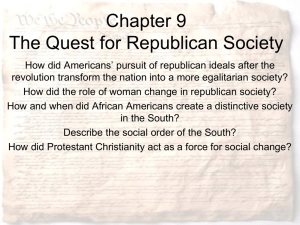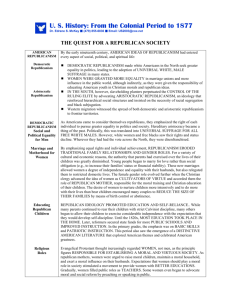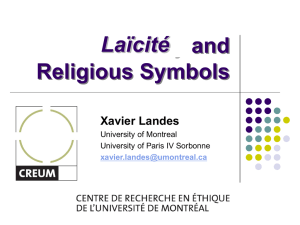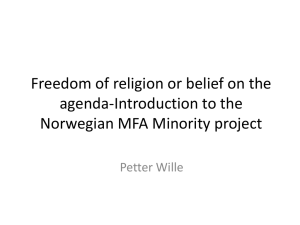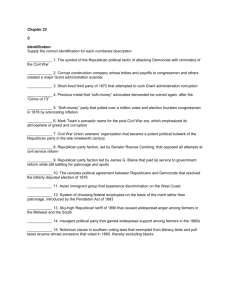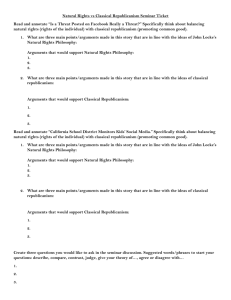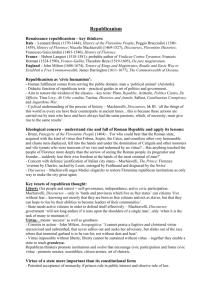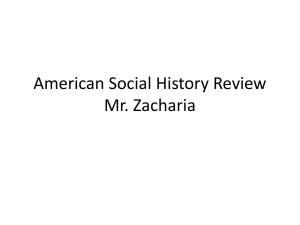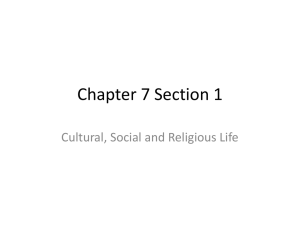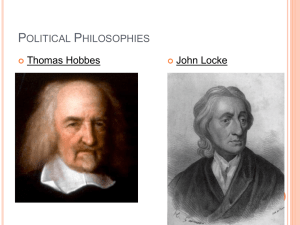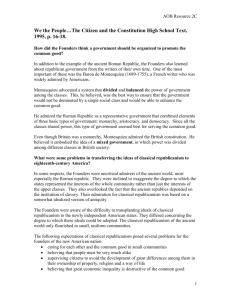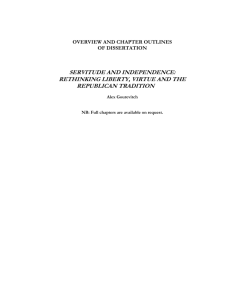AQCI 3 ANCEAU Benoit
advertisement
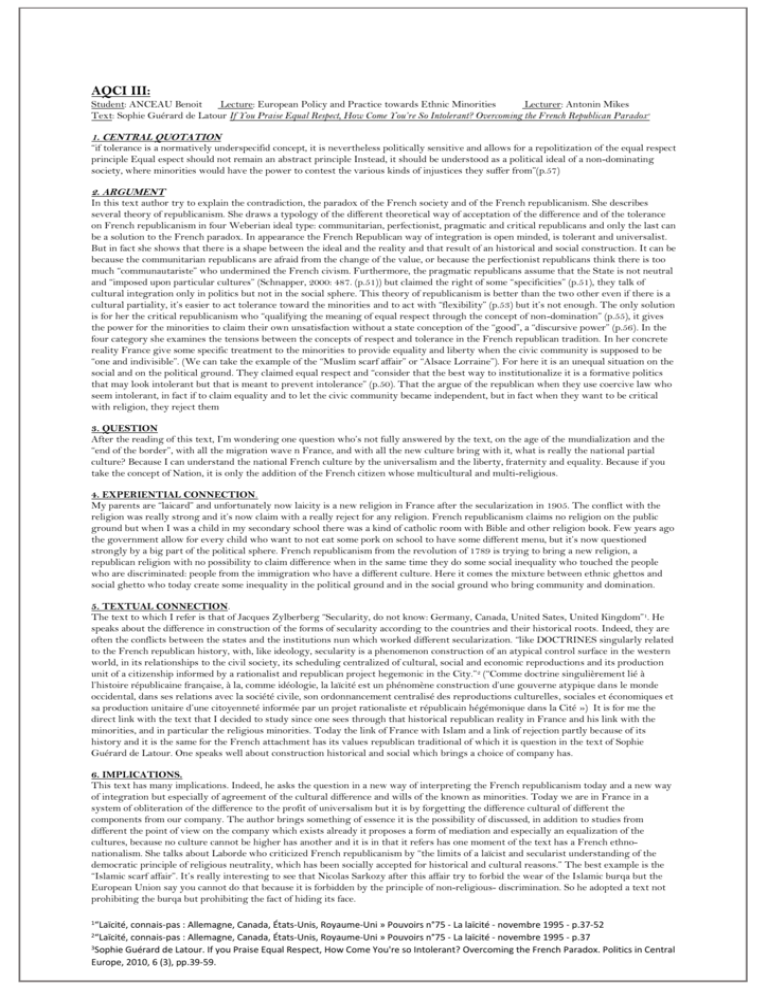
AQCI III: Student: ANCEAU Benoit Lecture: European Policy and Practice towards Ethnic Minorities Lecturer: Antonin Mikes Text: Sophie Guérard de Latour If You Praise Equal Respect, How Come You’re So Intolerant? Overcoming the French Republican Paradox3 1. CENTRAL QUOTATION “if tolerance is a normatively underspecifid concept, it is nevertheless politically sensitive and allows for a repolitization of the equal respect principle Equal espect should not remain an abstract principle Instead, it should be understood as a political ideal of a non-dominating society, where minorities would have the power to contest the various kinds of injustices they suffer from”(p.57) 2. ARGUMENT In this text author try to explain the contradiction, the paradox of the French society and of the French republicanism. She describes several theory of republicanism. She draws a typology of the different theoretical way of acceptation of the difference and of the tolerance on French republicanism in four Weberian ideal type: communitarian, perfectionist, pragmatic and critical republicans and only the last can be a solution to the French paradox. In appearance the French Republican way of integration is open minded, is tolerant and universalist. But in fact she shows that there is a shape between the ideal and the reality and that result of an historical and social construction. It can be because the communitarian republicans are afraid from the change of the value, or because the perfectionist republicans think there is too much “communautariste” who undermined the French civism. Furthermore, the pragmatic republicans assume that the State is not neutral and “imposed upon particular cultures” (Schnapper, 2000: 487. (p.51)) but claimed the right of some “specificities” (p.51), they talk of cultural integration only in politics but not in the social sphere. This theory of republicanism is better than the two other even if there is a cultural partiality, it’s easier to act tolerance toward the minorities and to act with “flexibility” (p.53) but it’s not enough. The only solution is for her the critical republicanism who “qualifying the meaning of equal respect through the concept of non-domination” (p.55), it gives the power for the minorities to claim their own unsatisfaction without a state conception of the “good”, a “discursive power” (p.56). In the four category she examines the tensions between the concepts of respect and tolerance in the French republican tradition. In her concrete reality France give some specific treatment to the minorities to provide equality and liberty when the civic community is supposed to be “one and indivisible”. (We can take the example of the “Muslim scarf affair” or “Alsace Lorraine”). For here it is an unequal situation on the social and on the political ground. They claimed equal respect and “consider that the best way to institutionalize it is a formative politics that may look intolerant but that is meant to prevent intolerance” (p.50). That the argue of the republican when they use coercive law who seem intolerant, in fact if to claim equality and to let the civic community became independent, but in fact when they want to be critical with religion, they reject them 3. QUESTION After the reading of this text, I’m wondering one question who’s not fully answered by the text, on the age of the mundialization and the “end of the border”, with all the migration wave n France, and with all the new culture bring with it, what is really the national partial culture? Because I can understand the national French culture by the universalism and the liberty, fraternity and equality. Because if you take the concept of Nation, it is only the addition of the French citizen whose multicultural and multi-religious. 4. EXPERIENTIAL CONNECTION. My parents are “laicard” and unfortunately now laicity is a new religion in France after the secularization in 1905. The conflict with the religion was really strong and it’s now claim with a really reject for any religion. French republicanism claims no religion on the public ground but when I was a child in my secondary school there was a kind of catholic room with Bible and other religion book. Few years ago the government allow for every child who want to not eat some pork on school to have some different menu, but it’s now questioned strongly by a big part of the political sphere. French republicanism from the revolution of 1789 is trying to bring a new religion, a republican religion with no possibility to claim difference when in the same time they do some social inequality who touched the people who are discriminated: people from the immigration who have a different culture. Here it comes the mixture between ethnic ghettos and social ghetto who today create some inequality in the political ground and in the social ground who bring community and domination. 5. TEXTUAL CONNECTION. The text to which I refer is that of Jacques Zylberberg “Secularity, do not know: Germany, Canada, United Sates, United Kingdom”1. He speaks about the difference in construction of the forms of secularity according to the countries and their historical roots. Indeed, they are often the conflicts between the states and the institutions nun which worked different secularization. “like DOCTRINES singularly related to the French republican history, with, like ideology, secularity is a phenomenon construction of an atypical control surface in the western world, in its relationships to the civil society, its scheduling centralized of cultural, social and economic reproductions and its production unit of a citizenship informed by a rationalist and republican project hegemonic in the City.” 2 (“Comme doctrine singulièrement lié à l’histoire républicaine française, à la, comme idéologie, la laïcité est un phénomène construction d’une gouverne atypique dans le monde occidental, dans ses relations avec la société civile, son ordonnancement centralisé des reproductions culturelles, sociales et économiques et sa production unitaire d’une citoyenneté informée par un projet rationaliste et républicain hégémonique dans la Cité ») It is for me the direct link with the text that I decided to study since one sees through that historical republican reality in France and his link with the minorities, and in particular the religious minorities. Today the link of France with Islam and a link of rejection partly because of its history and it is the same for the French attachment has its values republican traditional of which it is question in the text of Sophie Guérard de Latour. One speaks well about construction historical and social which brings a choice of company has. 6. IMPLICATIONS. This text has many implications. Indeed, he asks the question in a new way of interpreting the French republicanism today and a new way of integration but especially of agreement of the cultural difference and wills of the known as minorities. Today we are in France in a system of obliteration of the difference to the profit of universalism but it is by forgetting the difference cultural of different the components from our company. The author brings something of essence it is the possibility of discussed, in addition to studies from different the point of view on the company which exists already it proposes a form of mediation and especially an equalization of the cultures, because no culture cannot be higher has another and it is in that it refers has one moment of the text has a French ethnonationalism. She talks about Laborde who criticized French republicanism by “the limits of a laïcist and secularist understanding of the democratic principle of religious neutrality, which has been socially accepted for historical and cultural reasons.” The best example is the “Islamic scarf affair”. It’s really interesting to see that Nicolas Sarkozy after this affair try to forbid the wear of the Islamic burqa but the European Union say you cannot do that because it is forbidden by the principle of non-religious- discrimination. So he adopted a text not prohibiting the burqa but prohibiting the fact of hiding its face. 1 “Laïcité, connais-pas : Allemagne, Canada, États-Unis, Royaume-Uni » Pouvoirs n°75 - La laïcité - novembre 1995 - p.37-52 connais-pas : Allemagne, Canada, États-Unis, Royaume-Uni » Pouvoirs n°75 - La laïcité - novembre 1995 - p.37 3 Sophie Guérard de Latour. If you Praise Equal Respect, How Come You're so Intolerant? Overcoming the French Paradox. Politics in Central Europe, 2010, 6 (3), pp.39-59. 2“Laïcité,
